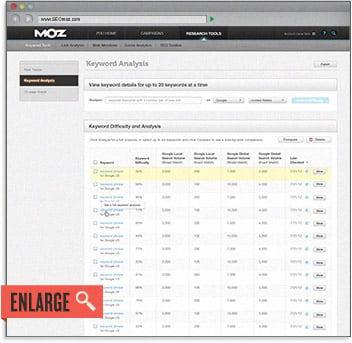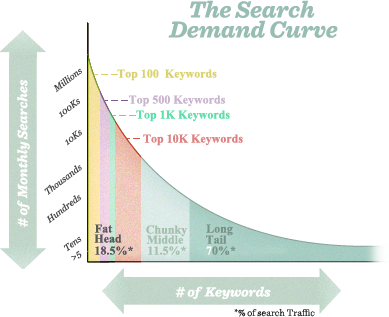How To Do Keyword Research - The Beginners Guide to ...

PDF DOWNLOAD ---->> CLICK HERE
It all begins with words typed into a search box.
It all begins with words typed into a search box.
Keyword research is one of the most important, valuable,
and high return activities in the search marketing field.
Ranking for the right keywords can make or break your website.
By researching your market's keyword demand, you can not
only learn which terms and phrases to target with SEO, but
also learn more about your customers as a whole.
and high return activities in the search marketing field.
Ranking for the right keywords can make or break your website.
By researching your market's keyword demand, you can not
only learn which terms and phrases to target with SEO, but
also learn more about your customers as a whole.
It's not always about getting visitors to your site, but about
getting the right kind of visitors. The usefulness of this
intelligence cannot be overstated; with keyword research you
can predict shifts in demand, respond to changing market
conditions, and produce the products, services, and content
that web searchers are actively seeking. In the history of
marketing, there has never been such a low barrier to entry in understanding the motivations of consumers in virtually any
niche.
getting the right kind of visitors. The usefulness of this
intelligence cannot be overstated; with keyword research you
can predict shifts in demand, respond to changing market
conditions, and produce the products, services, and content
that web searchers are actively seeking. In the history of
marketing, there has never been such a low barrier to entry in understanding the motivations of consumers in virtually any
niche.
HOW TO JUDGE THE VALUE OF A KEYWORD
How much is a keyword worth to your website? If you own an online shoe store, do you make more sales from visitors searching for "brown shoes" or "black boots"? The keywords visitors type into search engines are often available to webmasters, and keyword research tools allow us to find this information. However, those tools cannot show us directly how valuable it is to receive traffic from those searches. To understand the value of a keyword, we need to understand our own websites, make some hypotheses, test, and repeat—the classic web marketing formula.
| A basic process for assessing a keyword’s value | ||
Ask yourself...
Is the keyword relevant to your website's content? Will searchers find what they are looking for on your site when they search using these keywords? Will they be happy with what they find? Will this traffic result in financial rewards or other organizational goals? If the answer to all of these questions is a clear "Yes!" then proceed ...
Search for the term/phrase in the major engines
Understanding which websites already rank for your keyword gives you valuable insight into the competition, and also how hard it will be to rank for the given term. Are there search advertisements running along the top and right-hand side of the organic results? Typically, many search ads means a high-value keyword, and multiple search ads above the organic results often means a highly lucrative and directly conversion-prone keyword.
Buy a sample campaign for the keyword at Google AdWords and/or Bing Adcenter
If your website doesn't rank for the keyword, you can nonetheless buy test traffic to see how well it converts. InGoogle Adwords, choose "exact match" and point the traffic to the relevant page on your website. Track impressions and conversion rate over the course of at least 200-300 clicks.
Using the data you’ve collected, determine the exact value of each keyword
For example, assume your search ad generated 5,000 impressions in one day, of which 100 visitors have come to your site, and three have converted for a total profit (not revenue!) of $300. In this case, a single visitor for that keyword is worth $3 to your business. Those 5,000 impressions in 24 hours could generate a click-through rate of between 18-36% with a #1 ranking (see the Slingshot SEO study for more on potential click-through rates), which would mean 900-1800 visits per day, at $3 each, or between 1 and 2 million dollars per year. No wonder businesses love search marketing!
| ||
It's wonderful to deal with keywords that have 5,000 searches a day, or even 500 searches a day, but in reality, these popular search terms actually make up less than 30% of the searches performed on the web. The remaining 70% lie in what's called the "long tail" of search. The long tail contains hundreds of millions of unique searches that might be conducted a few times in any given day, but, when taken together, comprise the majority of the world's search volume.
Another lesson search marketers have learned is that long tail keywords often convert better, because they catch people later in the buying/conversion cycle. A person searching for "shoes" is probably browsing, and not ready to buy. On the other hand, someone searching for "best price on Air Jordan size 12" practically has their wallet out!
Understanding the search demand curve is critical. To the right we've included a sample keyword demand curve, illustrating the small number of queries sending larger amounts of traffic alongside the volume of less-searched terms and phrases that bring the bulk of our search referrals.


KEYWORD RESEARCH
Resources
Where do we get all of this knowledge about keyword demand and keyword referrals? From research sources like these:
- Google AdWords Keyword Planner Tool
- Google Trends
- Microsoft Bing Ads Intelligence
- Wordtracker’s Free Basic Keyword Demand
Google's AdWords Keyword Planner tool is a common starting point for SEO keyword research. It not only suggests keywords and provides estimated search volume, but also predicts the cost of running paid campaigns for these terms. To determine volume for a particular keyword, be sure to set the Match Type to [Exact] and look under Local Monthly Searches. Remember that these represent total searches. Depending on your ranking and click-through rate, the actual number of visitors you achieve for these keywords will usually be much lower.
Other sources for keyword information exist, as do tools with more advanced data. The Moz blog category on Keyword Research is an excellent place to start.
KEYWORD DIFFICULTY
What are my chances of success?
In order to know which keywords to target, it's essential to not only understand the demand for a given term or phrase, but also thework required to achieve high rankings. If big brands take the top 10 results and you're just starting out on the web, the uphill battle for rankings can take years of effort. This is why it's essential to understand keyword difficulty.

Different tools around the web help provide this information. One of these, Moz’s own Keyword Analysis Tool does a good job collecting all of these metrics and providing a comparative score for any given search term or phrase.












0 comments:
Post a Comment